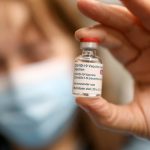

AstraZeneca vaccine not to be offered to Orkney adults under 30

Adults under 30 in Orkney will only be offered the Pfizer COVID-19 vaccine — for the time being — NHS Orkney has confirmed.
This news follows international concern over potential side effects related to the AstraZeneca vaccine.
The announcement came, this morning, Friday, from NHSO director of Public Health, Dr Louise Wilson.
Dr Wilson explained that, guidance around the use of AstraZeneca has changed due to an ongoing review into a very rare blood clotting problem affecting a small number of people worldwide, which may be linked to the vaccine.
People 30 or over will continue to be offered either the AstraZeneca or Pfizer vaccine. However, while investigations continue into its effects, 18 to 29-year-olds will not be offered the Astra Zeneca unless there is an individual medical reason why that brand might be preferable. At this stage, NHS Orkney is not expecting to receive any supply of the Moderna vaccine.
If you have already received one dose of the AstraZeneca vaccine, you will still be offered AstraZeneca as your second dose.
Dr Wilson explained that the blood clotting problem which is being reported is one which is very rare, but appears to be more prevalent in younger people. Overall, she believes that the risk of severe illness from COVID-19 far outweighs the risk from receiving the vaccine.
She said: “Although the risk of developing this very rare clotting problem is very low indeed, people are advised to be aware of any of the following symptoms occurring between four days and four weeks after vaccination and to seek immediate medical advice if you develop any of them:
- a severe headache that is not relieved with painkillers or is getting worse
- headache that feels worse when you lie down or bend over
- a headache that’s unusual for you and occurs with blurred vision, feeling or being sick, problems speaking, weakness, drowsiness or seizures (fits);
- a rash that looks like small bruises or bleeding under the skin;
- shortness of breath, chest pain, leg swelling or persistent abdominal (tummy) pain.
“These symptoms can be caused by many other conditions, and even if not caused by this rare specific clotting problem, they could indicate another condition that needs to be assessed.”
There is more information on NHS Inform Website, including a specific leaflet about COVID vaccinations and clotting — http://www.healthscotland.com/uploads/documents/45108-
COVID%20vaccine%20and%20blood%20clotting%20leaflet_English.pdf